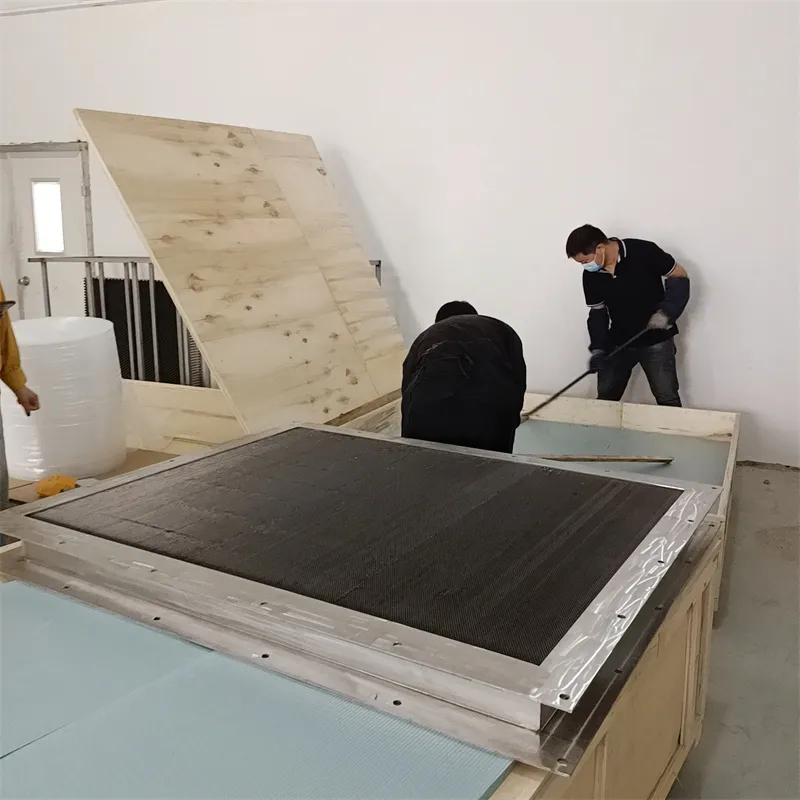
- Afrikaans
- Albanian
- Amharic
- Arabic
- Armenian
- Azerbaijani
- Basque
- Belarusian
- Bengali
- Bosnian
- Bulgarian
- Catalan
- Cebuano
- China
- China (Taiwan)
- Corsican
- Croatian
- Czech
- Danish
- Dutch
- English
- Esperanto
- Estonian
- Finnish
- French
- Frisian
- Galician
- Georgian
- German
- Greek
- Gujarati
- Haitian Creole
- hausa
- hawaiian
- Hebrew
- Hindi
- Miao
- Indonesian
- Italian
- Japanese
- Javanese
- Malay
- Persian
- Portuguese
- Punjabi
- Russian
- Spanish
- Swahili
- Telugu
- Vietnamese

Feb . 10, 2025 11:26
Back to list
air flow straightener
In the dynamic landscape of the modern manufacturing industry, a steel plate manufacturer stands out by blending innovation with traditional craftsmanship. As businesses increasingly rely on high-quality steel plates, understanding the intricacies of production, the benefits of using superior materials, and the capabilities of a leading manufacturer can significantly affect the choice-making process.
The benefits of choosing a reputable steel plate manufacturer are manifold. Firstly, the assurance of material integrity is paramount; a well-manufactured steel plate possesses the necessary mechanical properties such as tensile strength, ductility, and impact resistance, ensuring its suitability for demanding applications. Additionally, by collaborating with established manufacturers, businesses gain access to technical support and customization services tailored to unique project requirements. Another significant advantage is the potential for cost savings over the product lifecycle. A high-quality steel plate reduces the risk of premature structural failures and maintenance costs. It ensures long-term performance, which is crucial for infrastructure projects where safety and longevity are non-negotiable. Furthermore, leading manufacturers provide a wide range of steel plates, including carbon, alloy, and stainless steel varieties, offering versatility for numerous uses. Their ability to offer custom dimensions and finishes allows clients to procure materials that best suit their specific needs. This level of customization is supported by advanced manufacturing technologies that facilitate the production of steel plates with tight tolerances and precise specifications. In summary, partnering with a eminent steel plate manufacturer offers a host of benefits driven by their experience, expertise, authority, and trustworthiness. As industries continue to grow and evolve, the demand for high-quality steel products remains a constant. By understanding the capabilities and advantages of top-tier manufacturers, companies are better equipped to make informed decisions that align with their operational and project goals.


The benefits of choosing a reputable steel plate manufacturer are manifold. Firstly, the assurance of material integrity is paramount; a well-manufactured steel plate possesses the necessary mechanical properties such as tensile strength, ductility, and impact resistance, ensuring its suitability for demanding applications. Additionally, by collaborating with established manufacturers, businesses gain access to technical support and customization services tailored to unique project requirements. Another significant advantage is the potential for cost savings over the product lifecycle. A high-quality steel plate reduces the risk of premature structural failures and maintenance costs. It ensures long-term performance, which is crucial for infrastructure projects where safety and longevity are non-negotiable. Furthermore, leading manufacturers provide a wide range of steel plates, including carbon, alloy, and stainless steel varieties, offering versatility for numerous uses. Their ability to offer custom dimensions and finishes allows clients to procure materials that best suit their specific needs. This level of customization is supported by advanced manufacturing technologies that facilitate the production of steel plates with tight tolerances and precise specifications. In summary, partnering with a eminent steel plate manufacturer offers a host of benefits driven by their experience, expertise, authority, and trustworthiness. As industries continue to grow and evolve, the demand for high-quality steel products remains a constant. By understanding the capabilities and advantages of top-tier manufacturers, companies are better equipped to make informed decisions that align with their operational and project goals.
Prev:
Next:
Products categories
Latest news
-
Why Vented Aluminum Honeycomb Is Leading the Way in Shielding and Ventilation SolutionsNewsJul.18,2025
-
Why Stainless Steel Honeycomb Panel is the Ultimate Choice for High-Tech Shielding and ProtectionNewsJul.18,2025
-
Why Honeycomb Strips Are Revolutionizing High-Speed Sealing SolutionsNewsJul.18,2025
-
Shielded Glass Innovation Powers the Future of Electromagnetic ProtectionNewsJul.18,2025
-
Precision Starts Here: Revolutionizing Airflow Control with Honeycomb Wind Tunnel SolutionsNewsJul.18,2025
-
Elevate Industrial Performance with Precision-Engineered Steel Honeycomb Core SolutionsNewsJul.18,2025
-
Vented Aluminum Honeycomb: A Smart Shield for Airflow and EMI ControlNewsJul.11,2025















